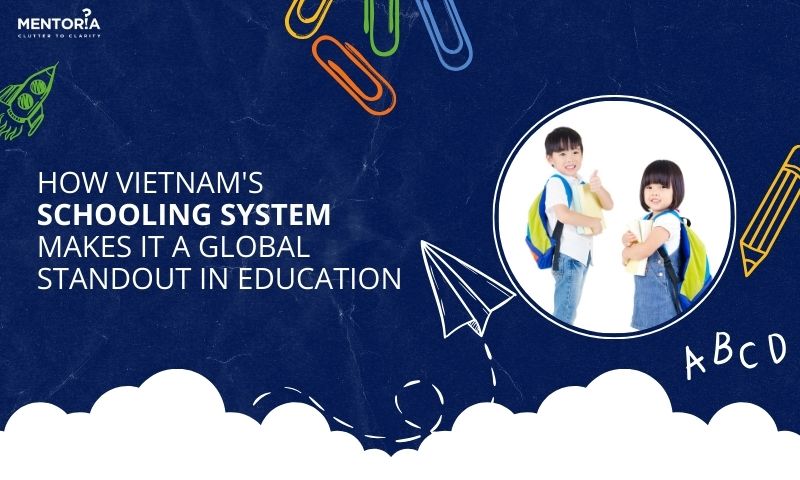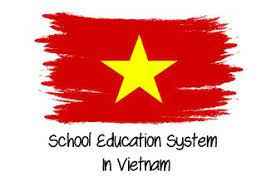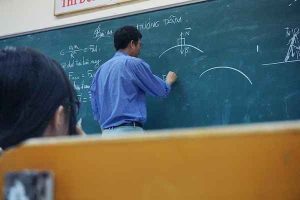How Vietnam’s Schooling System Makes It A Global Standout In Education

On the bustling streets of Ho Chi Minh City, alive with the rhythm of students on an unstoppable quest for knowledge, what makes Vietnam’s schooling system a shining star in the global constellation of education?
Forget dusty textbooks and stuffy classrooms; the story of education in Vietnam is a blend of commitment, quality, and a sprinkle of global flavour. It’s about rewriting the book on education to match the demands of the 21st century.
In this blog, we’re taking a deep dive into the secrets that place Vietnam at the pinnacle of the schooling game.
Why Does Vietnam Top The List Of Having The Best Schooling System?
The Power Of Commitment
Vietnam’s educational success story kicks off with an unwavering commitment to learning. Walk down the lively streets of Ho Chi Minh City, and you’ll sense it – a culture that firmly believes education, coupled with hard work, is the secret sauce to success. Vietnamese society has put its money where its mouth is, with significant investments, both public and private, echoing the belief that a robust education system is the cornerstone of individual and national prosperity.
Students are on a constant journey between school and extra classes, showing serious dedication. It’s more than just clocking hours; it’s about knowing that education is a lifelong adventure. You can feel their commitment in every step toward a brighter future.
Why Quality Always Reigns Supreme
In recent years, the country has embraced a dual approach: expanding enrollment while setting and enforcing minimum quality standards for schools nationwide. It’s a strategy that screams, “We’re not just here to fill seats; we’re here to fill minds.”
Teacher quality takes centre stage in this pursuit of excellence. Vietnam has done the groundwork by professionalising its teaching force and establishing standards that go beyond just qualifications. It’s about ensuring that educators possess not only the necessary knowledge but also the skills and dispositions to create an enriching learning environment. The cultural reverence for teachers becomes a driving force, ensuring that the classroom is not just a space but a sanctum of quality education.
Embracing The Global Pulse
Vietnam doesn’t believe in isolation; it believes in evolution through inspiration. The nation eagerly looks beyond its borders, drawing inspiration from high-performing countries like Korea and Singapore. It’s a global classroom where Vietnamese experts regularly study successful curriculum reforms and participate in initiatives fostering innovative teaching methods. The openness to new ideas and methodologies is the heartbeat of Vietnam’s commitment to staying ahead in the global education race.
The country is not just a passive observer; it actively engages in initiatives like the Escuela Nueva pilot adapted from Colombia and ASEAN seminars focusing on deeper learning skills. Vietnam’s educational landscape isn’t static; it’s a canvas that willingly incorporates lessons learned from previous reforms and international endeavours. It’s this outward orientation that propels Vietnam from good to great in the realm of global education.
The Path Ahead: A 21st Century Curriculum Revolution
Vietnam recognises that the journey doesn’t end with past achievements; it’s a continuous quest for improvement. The next milestone on this educational odyssey is a comprehensive reform to design coherent, high-quality curricular standards. The Ministry of Education and Training (MOET) is at the helm, collaborating with K–12 educators to create a curriculum that goes beyond basic numeracy and literacy.
The vision is clear – to foster higher-order cognitive and behavioural skills, including creative and critical thinking. It’s not just about preparing students to absorb information; it’s about empowering them to apply knowledge in real-world scenarios. Vietnam’s educational architects understand that success in the 21st century demands more than rote learning; it requires a curriculum that nurtures competencies essential for mastering content and thriving in an ever-evolving world.
Upgrading Instructional Practices: Bridging The Gap
While a revamped curriculum is a crucial step, Vietnam acknowledges that the true transformation happens in the classrooms. Traditional lecture-style, rote learning still dominates, and the challenge is to bridge the gap between policy and practice. The solution lies not just in introducing a new curriculum but in ensuring that teaching methods align with the envisioned changes.
Vietnamese policymakers are keenly aware that change in classroom instruction is what will make the difference. A comprehensive set of aligned textbooks and teaching materials is in the pipeline, providing crucial support for educators transitioning to the new curriculum. It’s not just about what’s taught; it’s about how it’s taught, ensuring that active, student-centred approaches become the norm rather than the exception.
Stakeholder Engagement: A Collective Responsibility
Implementing educational reforms isn’t a solitary endeavour; it’s a collective responsibility. Ensuring the success of new curricular standards and pedagogical models requires the support and understanding of stakeholders – educators, parents, and students alike. Clear communication, consultation campaigns, and outreach efforts are part of the strategy to foster public support for the revised curriculum.
MOET understands that for this transformation to take root, stakeholders need not just information but a belief in the vision. Curriculum piloting and comprehensive training programmes are in the works, ensuring that teachers are not just informed about the changes but actively engaged in the educational evolution. It’s not just about changing what happens in the classroom; it’s about changing hearts and minds to embrace the future of education.
Building Capacity: The Teacher’s Journey
Empowering teachers for the paradigm shift is a cornerstone of Vietnam’s educational evolution. The transition from traditional teaching methods to a more dynamic approach requires a deeper mastery of subjects and a broader pedagogical repertoire. The call is for a teacher who doesn’t just transmit knowledge but fosters the development of higher-order skills in their students.
Vietnam acknowledges that professional development is a linchpin in this transformation. The current model is under scrutiny, with a focus on upgrading to a more tailored and sustained approach. It’s not just about a one-time training; it’s about continuous learning that equips teachers with the skills needed for the evolving landscape of education. Building instructional capacity isn’t a one-size-fits-all endeavour; it’s a personalised journey that ensures teachers are not just prepared but inspired to lead the change.
Navigating Vietnam’s Education Landscape With Mentoria
As Vietnam continues its journey towards modernisation, its education system stands as a captivating model for the world. Learning from the successes and challenges, Vietnam’s commitment to innovation and adaptability positions it as a frontrunner in the global education arena. The road ahead holds the promise of a dynamic and progressive education system that equips the youth with the skills and knowledge necessary for success in the 21st century.
Mentoria is your trusted guide in navigating the complexities of Vietnam’s schooling system. Our tailored strategies align seamlessly with the country’s educational landscape. Connect with our career mentors to discover the right path for your child, choosing from 3 streams, 850+ courses, and 12,000+ careers. Let Mentoria be your companion in sculpting a future of educational excellence for your child. Call us today and kick-start your child’s transformative journey!









